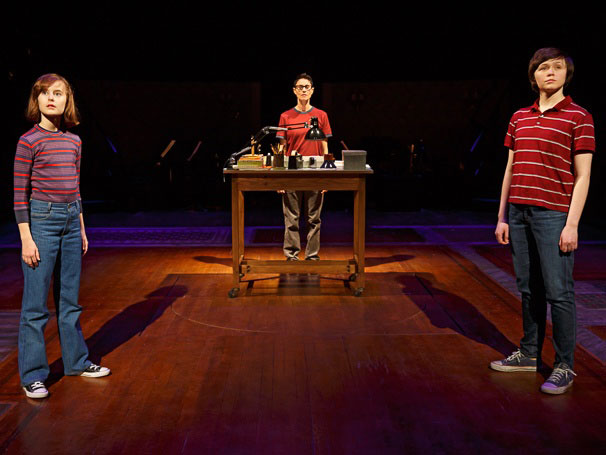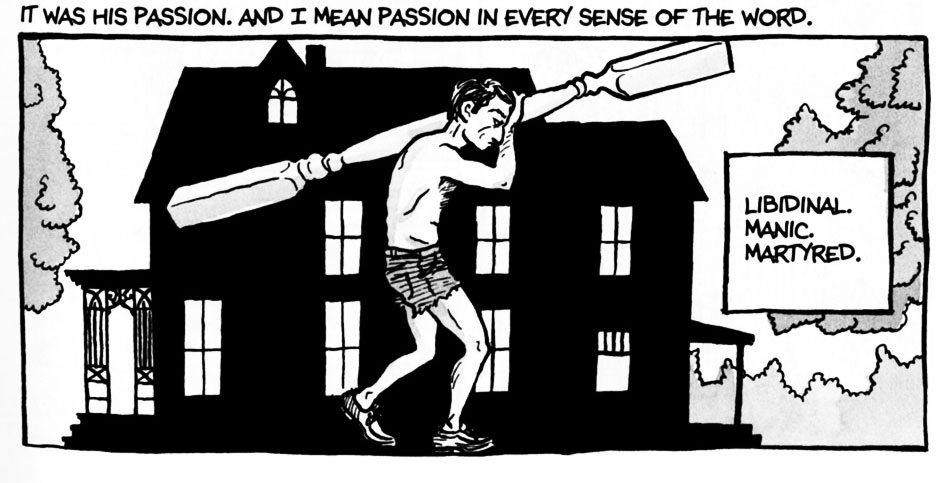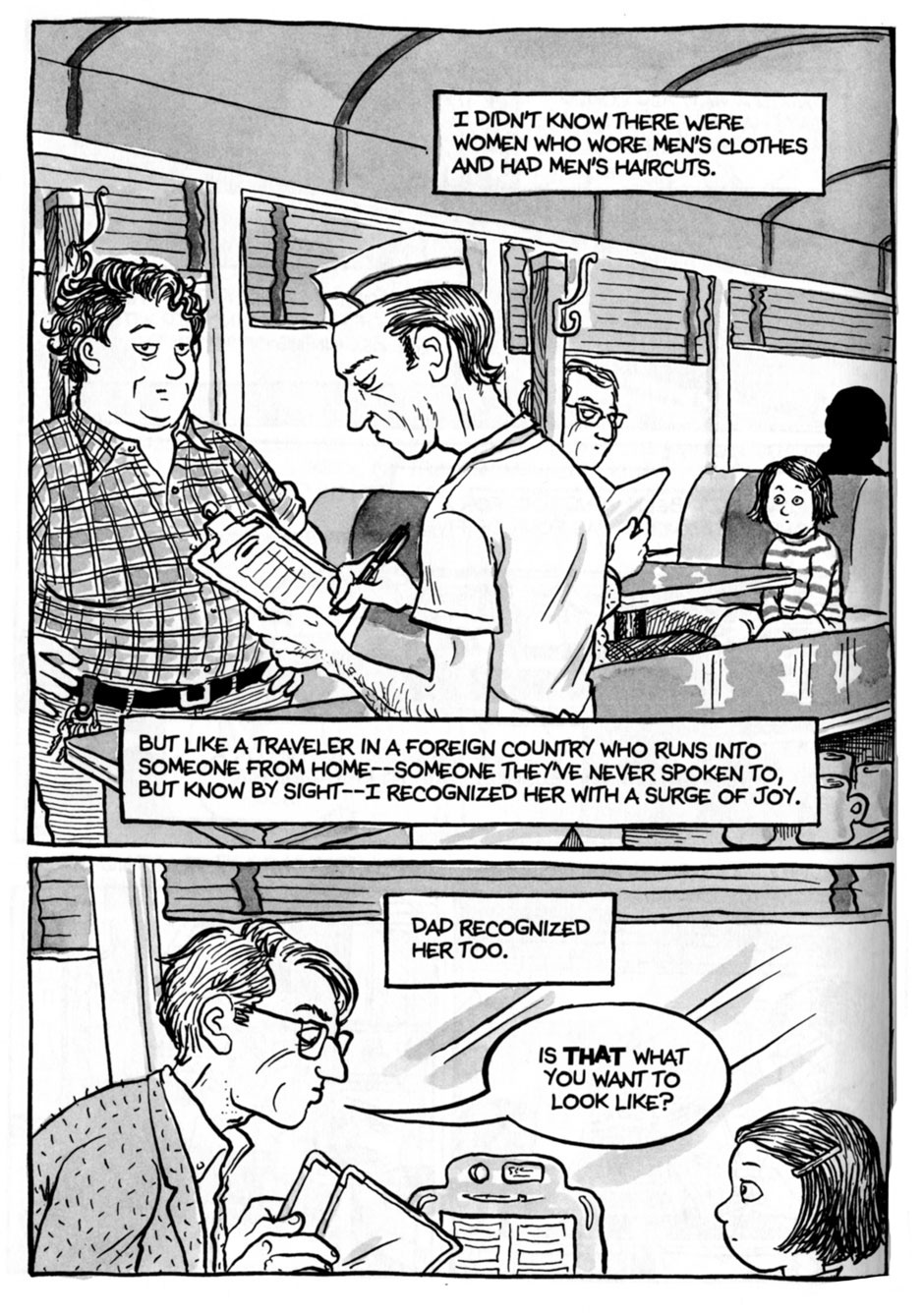At a sales kiosk in the lobby of Broadway’s Circle in the Square Theater, where the musical Fun Home is playing, one can purchase copies of Alison Bechdel’s graphic memoir, on which it is based. On the evening I attended, book sales were slow, and it seemed clear to me, from the conversations I overheard, that many members of the audience filing in to see the sold-out performance—the production directed by Sam Gold, which was first staged at the Public Theater, is nominated for Tony Awards in twelve categories, including Best Musical—had already read and admired the book, and most likely owned a copy.
First published in 2006, Bechdel’s “family tragicomic” has attracted a wide and devoted following with its wittily told and touching story of the cartoonist’s early life. Her father, Bruce, was a popular high school English teacher, the owner and proprietor of the family funeral home business, and an obsessive home-renovator, pouring his prodigious energies into the restoration of a Gothic Revival house in their small Pennsylvania town. He was also a gay man who suffered, and who made his family suffer, because of his inability to admit, or come to terms with, his sexuality. Only his wife knew the truth about his affairs with men and boys, and agreed to keep her husband’s secret.
Within the space of a few months, this fragile treaty unraveled. By then a student at Oberlin College, Alison wrote a letter informing her parents that she was a lesbian. Soon after, her mother asked her father for a divorce. And two weeks after that, Bruce Bechdel killed himself by stepping in front of a Sunbeam Bread truck, not far from their home.
Part of what’s fascinating about the Broadway adaptation, with its script and lyrics by Lisa Kron and music by Jeanine Tesori, is how closely it adheres to the outline and details of Bechdel’s story—yet so differs from the book that it seems to be a related but entirely original work. Together, the memoir and the musical argue for the fact that plot and character are just a part of what affects us when we experience art. Our response is also determined by form, genre, setting—not only by the story but by the way the story is told.
What carries us through the memoir is Bechdel’s wry and painful personal history and the charm of the narrator’s voice, expressed in captions, thought and dialogue balloons, and illustrations, all of which seem to play off—and against—one another to enhance and augment the information we extract from each frame. Often several levels of time happen simultaneously, as the captions, pictures, and dialogue each appear to tell a slightly different version of the story and to look back on it from varying degrees of distance. The voice is not merely clever but intelligent, literary, sympathetic—at once funny, sharp, and kind. The humor ranges from broad to subtle, but we never feel that a joke is being made at a character’s expense. Questioning, reflective, seeking new interpretations and open to new conclusions, the narration attempts to ferret out the truth of what happened and why: of how the Bechdels’ outwardly normal domestic life—secretly rife with angst and yearning, Gothic indeed—stayed intact for as long as it did, and then so rapidly imploded.
Each panel is chock full of information, of commentary and counter-comments. In one frame, Bechdel describes her father’s fervor for historical restoration. Across the top we read, “It was his passion in every sense of the word.” The image is of a man, bare-chested, resembling Christ or a martyr in an Old Master painting, wearing only a pair of cut-off dungaree shorts, stooped beneath the weight of tall heavy architectural post that he is carrying on his shoulder as a penitent would carry a cross. In a box to his right are three words that characterize Bruce Bechdel’s passion: “Libidinal. Manic. Martyred.”
At moments the honesty of the voice undercuts the tragedy of Bruce’s death, as it does in a series of panels that illustrate the way in which even the most horrible things can seem funny. Near the end of the memoir, Alison can barely stop laughing when she tells a friend that her father had been hit by a truck: “The idea that my vital, passionate father was decomposing in a grave was ridiculous.”
The musical retains the narrator’s spirit, if not so much her voice. It is less literary, less dense, less layered, less ironic; there are fewer references to Greek mythology and to books, fewer striking turns of phrase, and none of the juxtapositions that make us pause to consider how captions, dialogue, and thought balloons support or contradict the images we are being shown. But if we miss what the book provides, we are swept along by what the play offers instead. The powerful emotions that run beneath the surface of the memoir—the pained nostalgia, the sense of loss, the bewilderment, the grief and joy—infuse the music, the staging, and the actors’ performances. In a booklet about the play distributed to audience members eligible to vote in the Tony awards competition, Bechdel writes,
Advertisement
One of the most stunning things about watching Lisa and Jeanine adapt my book was the way that they homed in on all the crucial emotional moments of the story in this incredibly precise, almost surgical way. They seemed to be able to see the emotions of the story more clearly than I could, it was like they found the acupuncture points of the story and inserted needles in the exact right spots.
The play is so engrossing that only after seeing it do you think about the challenges that the adaptation must have posed. One must have involved the way the memoir skips rapidly back and forth in time, often spanning decades within a single frame. Kron’s ingenious solution has been to split Alison’s role among three actresses, all of them (in this production) hugely gifted: Beth Malone plays the grown-up cartoonist Alison, costumed in a way that evokes Waldo in the Where’s Waldo? children’s books, and with Waldo’s ability to hang at the edges of the action; we watch her trying to understand the characters’ motives and feelings—and to find the right caption that will let her condense what she’s observing and render it into two dimensions. Emily Skeggs delivers an equally virtuosic performance as the college-age Alison, a person in the process of finding out who she is and what she wants. And as “Small Alison,” Sydney Lucas captures the ecstatic freedom of being a child, and the resistance that nearly every girl, gay or straight, feels at the prospect of trading that freedom for the dubious pleasures of becoming a miniature adult: a woman-in-training.
It’s instructive to see what Tesori has chosen to put into song. In a brief scene in the memoir, young Alison, eating in a Philadelphia luncheonette with her father, spots a tough, old-school butch lesbian, with a man’s haircut and wearing men’s clothes. “Like a traveler in a foreign country who runs into someone from home—someone they’ve never spoken to, but know by sight—I recognized her with a surge of joy.” In the play, this relatively minor event because a besotted love aria to a new and startling vision of possibility, of a potential (and previously unsuspected) future.
Things that are understood and understated in the memoir are given additional drama and intensity on stage. At the risk of stating the obvious: there is an enormous difference in how we respond to a character if we are looking at a cartoon or watching a human being.
The suppressed anger and grief of Alison’s mother Helen reveals itself in the memoir through, among other subtle touches, the fact that Wallace Stevens’s “Sunday Morning” is her favorite poem. “Perhaps,” the narrator muses, “she also liked the poem because its juxtaposition of catastrophe with a plush domestic interior is life with my father in a nutshell.” But in the play, Helen (brilliantly acted by Judy Kuhn) is given a devastating ballad, “Days,” in which she mourns an entire life spent and wasted among the minutiae of a domestic existence with a husband whose torment has blighted the happy marriage she’d once imagined.
Ultimately, the play makes us newly aware of the generosity of Bechdel’s portrait of her father: of her refusal to judge or condemn a man who was, in so many ways, an imperfect father. In a performance that combines great skill, heart, and courage, Michael Cerveris makes the vain, frightened, demanding, imperious and misguided Bruce sympathetic without ever being pathetic; he allows us to see past Bruce’s inappropriate flirtation with his children’s (male) babysitter and understand what it was like to be a secretly gay man, living in a close community, in constant fear of being exposed.
Walking into the theater, I’d heard an elderly woman tell her husband and the couple with which they’d come that Fun Home was a sad story—but also a happy story. It had a happy ending, she said. Apparently, she’d read the book and felt the need to reassure her companions about what they were about to see. I assumed she meant that Alison Bechdel had endured some confusing and tragic times but had come out the other side as an artist who could look back, still puzzled and saddened but also forgiving, smart, and with great empathy not only for her parents but for her younger self and for everyone who has ever experienced the strains and rewards of living in a family.
Advertisement
Fun Home the musical is playing at the Circle in the Square Theater through October 11, 2015. Fun Home the graphic memoir is published by Houghton Mifflin Harcourt.





